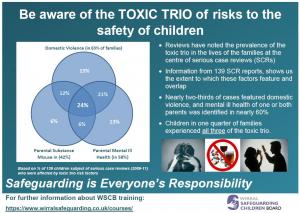Toxic Trio
The term ‘Toxic Trio’ is used to describe the issues of domestic abuse, mental ill health and substance misuse.
In an analysis of 139 serious case reviews, between 2009-2011 (Brandon et al 2012), – investigations showed that in over three quarters incidents (86%) where children were seriously harmed or died one or more of a “toxic trio” – mental illness, substance misuse and domestic abuse – played a significant part. These have all been identified as common features of families where harm to women and children occurs.
They are now viewed as key indicators of increased risk of harm to children and young people.
In one situation domestic abuse may be the result of women who use drugs being more likely to be in relationships with volatile men. In another situation maternal drug misuse may be a consequence of their experience of domestic abuse. Maternal mental ill health may be a result of violence or abuse that they have experienced or depression may lead a parent to misuse drugs or alcohol.
The poster below illustrates the Toxic Trio: Toxic Trio Poster for Professionals
Learning from SCR’s Case Study
The serious case review by Bracknell Forest Local Safeguarding Children Board examined a case where a two-month-old baby known as Child C had its right leg broken in 2013. It found that the various agencies involved with the family did not work together effectively leading to individual services making decisions without a full picture of the family’s history and situation.
The review said children’s social care over-relied on information from health professionals, who felt there were no concerns, despite being aware of the wider family context. Equally when children’s social care reviewed the family’s child in need plan in May 2012 and decided to close the case, it made the decision without input from health professionals who held relevant information.
“Overwhelmingly, this case makes clear that over-reliance on the opinion of health organisations or on children’s social care alone is to be avoided and all agencies must bring their own expertise to these difficult decisions,” concluded the report.
While the review found many examples of “highly effective inter-agency working” even when information was shared the response of the agencies involved was sometimes lacking.
This was the case when, a few days before Child C was taken to hospital in October 2013, the mother called 999 after an alleged incident where the baby’s father pulled out her hair and smacked her head against the floor while Child C’s sibling, a toddler, attempted to separate them.
“Police, children’s social care and health visitors were aware of the incident, yet there is no evidence that the emotional impact of C’s sibling witnessing domestic abuse was considered,” the review said, adding that there was also no evidence that any agency involved was minded to challenge that lack of action.
The review said it would have been useful if the police told children’s social care about incidents they had not classed as domestic abuse alongside other softer information they held about the family. However, it added, social care could have requested that information as part of the assessment process or held multi-agency discussions that would have allowed that information to have been shared.
Toxic trio
“Cases involving the toxic trio of domestic abuse, mental health issues and substance misuse cannot be worked effectively by any single agency,” the review emphasised.
Alex Walters, the independent chair of the safeguarding board, said good progress has been made by agencies to address the problems raised in the review, which was delayed due to criminal proceedings.
These changes included training social workers on the importance of family history, holding regular case file audits and creating regular opportunities for cases to be discussed with adult social care.
WSCB Training
The toxic trio forms a core part of the multi-agency training from the Wirral safeguarding Children and full day training is provided about Domestic Abuse, Substance misuse and Parental mental health. Further details of the courses and how to book is available here:
https://www.wirralsafeguarding.co.uk/courses/
WSCB Policies and Procedures
Responding to Children and Young People who are at Risk from Domestic Violence and Abuse – Policy and Guidance for Professionals:
http://wirrallscb.proceduresonline.com/chapters/p_resp_cyp_dv_pol_guide.html
Good Practice Guidance for working with Children and Families affected by Substance Misuse:
http://wirrallscb.proceduresonline.com/pdfs/substance_misuse_pract_guid.pdf
Mental Illness of a Parent or Carer Adult Mental Health and Children’s Services
Joint Working Protocol:
http://wirrallscb.proceduresonline.com/pdfs/mental_illness_of_a_parent.pdf

